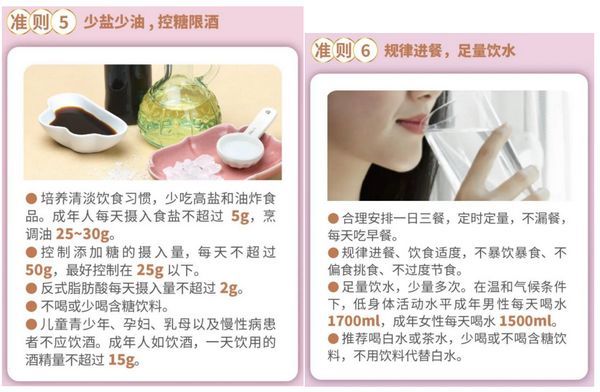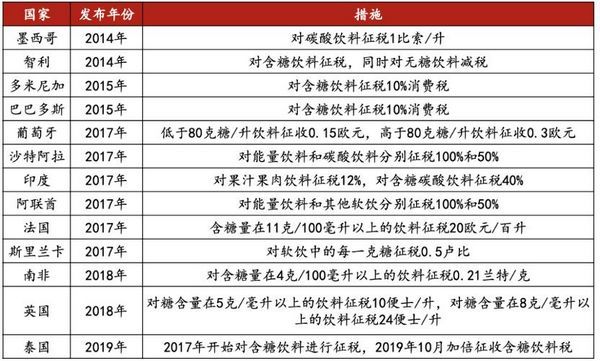On April 26, the “Dietary Guidelines for Chinese Residents (2022)” was released in Beijing. Compared with the previous version in 2016, it was revised and updated after 6 years. The latest edition of the Dietary Guidelines focuses on the dietary status and health needs of Chinese residents in recent years, and is revised and updated based on scientific principles of nutrition and the latest scientific evidence. It has played an important role in guiding residents to change their nutritional health status, prevent chronic diseases and enhance their health quality through a balanced diet.
Dietary Guidelines mention “sugar-sweetened beverages”
The “Dietary Guidelines for Chinese Residents (2022)” has extracted eight principles for a balanced diet: 1. Diverse foods and mix them reasonably; 2. Eat a balanced diet and maintain a healthy weight; Grain and soybean; 4. Eat fish, poultry, eggs, and lean meat in moderation; 5. Less salt and less oil, sugar control and alcohol limit; 6. Regular meals, enough water; , share meals with public chopsticks, and eliminate waste. Among them, new additions include “knowing how to cook, choose, and read labels” and “eating regularly and drinking enough water”, etc., and “sugar control” as the previously emphasized balanced diet principle has not only been retained, but also There are further elaborations and guidance in the eight basic principles.
The reporter found that Among the eight basic principles, two mentioned “contains Sugar Drinks”. Among them, in the guidelines of “less oil and less salt, sugar control and alcohol limit”, it is emphasized that the intake of added sugar should not exceed 50g per day, and it is best to control it below 25g;< span>No or less sugary drinks. In the guidelines of “eating regularly, drinking enough water”mentioned, drinking enough water ,No or less sugary drinks. Why are sugar-sweetened beverages so concerned in the “Dietary Guidelines for Chinese Residents (2022)”? The series of problems caused by the excessive consumption of sugar-sweetened beverages by contemporary people are the key.

Recently, Directors of Beijing Dietitian Association, Gu Zhongyi, Master of Public Health, Tsinghua UniversityPublish a popular science The harm of excessive sugar, The article shows that, in addition to causing obesity, sugar in the short termwill Increases the body’s inflammatory response; increases the risk of acne; the body‘s metabolic system will also have a big impact. In the long run, it will cause damage to the cognitive function of the brain and increase the risk of chronic non-communicable diseases including heart disease and tumors. “Take cardiovascular system diseases as an example, compared with people with about 8% of added sugar for energy, people with 17% to 21% of added sugar for energy have lower heart rate. The risk of vascular disease increased by about 38%, which is pretty scary.”
Dietary Guidelines released a new data:The overweight and obesity rate of children and adolescents aged 6-17 has reached 19.0%, while the adult residents in my country are overweight and obese has exceeded 50%. Weight control and total calorie control are extremely necessary. Previously, the 2018 “China Children’s Sugar-sweetened Beverage Consumption Report” showed that China’s children’s consumption of sugar-sweetened beverages is increasing.. The 2021 “Scientific Research Report on Dietary Guidelines for Chinese Residents” pointed out that excessive intake of sugar-sweetened beverages can increase the risk of obesity or weight gain in children and adults. It can be seen that not drinking or drinking sugar-sweetened beverages is critical to weight control.
Gu Zhongyi‘s article also showed an experiment in boiling sugar-sweetened beverages. Syrup came out. He said that it would be difficult for ordinary people to eat the same amount of sugar cubes normally, but putting these sugars in drinks would be “blinded” to a certain extent. “The public perceives that one of the hazards of sugar-sweetened beverages is that it will make people unknowingly consume excessive sugar and increase the burden on the body.
Recently, Professor Liang Yuhong of Peking University Stomatological Hospital pointed out that drinking a bottle of high-sugar beverage is equivalent to eating more than ten cubes of sugar, which increases the risk of caries. The sugar content of common drinks on the market is very high. A 500ml bottle of cola contains about 50g of sugar, which is the highest daily sugar intake recommended by the dietary guidelines.
How to control excess sugar intake
Sugar can causea range of healthproblems,and are readily available and costly Many countries have adopted various means to control sugar-sweetened beverages as much as possible, such as levying“sugar tax” . Sales of sugar-sweetened beverages after imposition“sugar tax”, study shows The amount will be greatly reduced, and the related taxes can also be used to support communities, schools, parks and other places, so that people can benefit..

Many countries and regions also have corresponding policies
Gu Zhongyi said that supports the imposition of a tax in China“sugar tax ”. “But sucrose is an important source of happiness at a low priceIt is not suitable for arbitrary deprivation. In addition, alsoshouldbe wary of overly complex policies that lead to excessive regulatory costs, which outweigh the gains. ”Therefore, he suggestedto go along with the future health labeling system for processed foods< /span>, set the tax rate according to different sugar content, so as to generate appropriate guidance. Finally, spend this part of the tax more on education for children< span>, let children be aware of the dangers of sugar-sweetened beverages and develop healthy eating habits.
Learning to read labels is a “good helper” for sugar control. The latest edition of the “Dietary Guidelines for Chinese Residents (2022)” specially updated a basic guideline – “knowing how to cook, choose, and read labels”. Learning to understand the nutrients behind food and choosing more high-quality and healthy food has become an important skill to help the public have a balanced diet and live a healthy life.
To learn to read food labels, you need to have a “ruler” in your heart to measure whether the food is nutritious and healthy, and have a scientific dietary concept. Food nutrition labels usually include the name, content, and percentage of the nutrient reference value of the energy and nutrients in the food. According to Chinese standards, the sugar content of each 100g or 100ml of food is less than or equal to 5g is “low-sugar food”, and less than or equal to 0.5g is “sugar-free food”. In this way, consumers can more conveniently choose low-sugar or sugar-free beverages to avoid excessive sugar intake caused by excessive consumption of beverages with high sugar content, which is not conducive to healthy diet and weight control.
What if you want to enjoy the pleasure of sugar, but don’t want the health risks of too much sugarexcessive intake? The sugar substitute that has emerged in recent years may be a good choice. Chen Junshi, an academician of the Chinese Academy of Engineering, said that it will be a trend for the beverage industry to replace sugar with sweeteners. Among them, erythritol is higher-grade and safer. The application of erythritol is not only a “safe solution” for dietary sugar control, but also the direction of progress in food production and consumption.